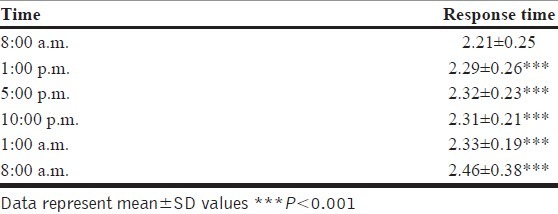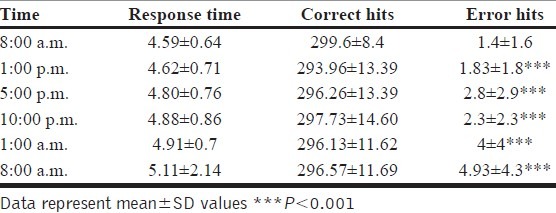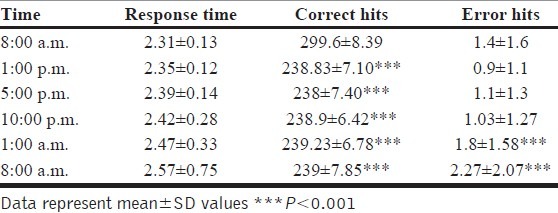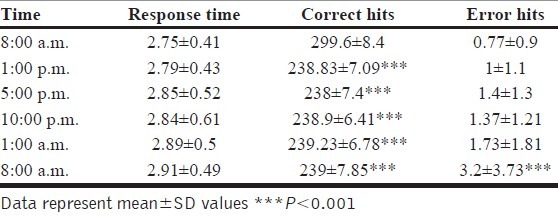Abstract
Context:
Sleep deprivation is known to have detrimental effects on attentional resources and cognitive functions.
Aim:
The aim of this study is to assess the changes in performance, due to 24 h of sleep deprivation, in medical students
Materials and Methods:
The performance was assessed using simple paper–pencil tasks, such as digit symbol substitution test, digit vigilance test, and letter cancellation tasks.
Results:
The results revealed an increase in the number of errors in letter cancellation tasks and digit vigilance test, with a significant decrease in the number of correct responses on the letter cancellation task. The time taken to complete the tests increased with lack of sleep, with the digit symbol substitution test being affected the most.
Discussion:
This study infers that sleep deprivation for 24 h affected the judgment ability more than the response speed.
Conclusion:
Sleep deprivation might lead to compromised performance of medical students in examinations.
Keywords: Digit symbol substitution test, digit vigilance test, letter cancellation task, sleep deprivation
INTRODUCTION
Vigilance is a term used synonymously with alertness or sustained attention and reflects arousal and cognitive performance.[1] Vigilance can be assessed either by computer-based tests or by well-established paper-pencil tasks such as the letter cancellation tasks and digit symbol substitution test.[2,3] The paper-pencil tasks are easy to administer and inexpensive, making them suitable for operational settings wherein computer-based tasks cannot be used.
Vigilance and sleep are inseparable from a physiologist′s point of view. Sleep by itself is an important factor affecting the cognitive processes.[4] However, in modern-day society, sleep is getting lesser and lesser priority, thereby affecting performance at work. Sleep deprivation brings about an increase in reaction time and errors.[3] The decrease in vigilance and performance can lead to disastrous outcomes in professions such as medicine, air traffic monitoring, and armed forces where a high level of vigilance and performance is always required.
Various studies have been done to evaluate the effect of sleep deprivation and performance. In a study on anesthesiology residents, Bartel et al. found a psychomotor deficit in 52% of sleep-deprived doctors.[5] This was accompanied by increased reaction time especially in simple reaction task, thereby suggesting that monotonous tasks were more susceptible to deterioration of performance. Santhi et al. also found a slowing of response with decreased accuracy due to sleep deprivation.[6] However, Webb and Levy reported no effect of 48 h of sleep deprivation on performance of the one-letter cancellation task.[7] In contrast, Lubin et al. found a significant impairment after complete sleep loss.[8] Babkoff et al. evaluated the effect of 72 h of sleep deprivation by using three versions of a search task having two, four, and six target letters.[9] They found a significant decrease in performance, more for the four- and six-letter versions, with the decrease being more on the third day a compared to the first day. In contrast to performance, accuracy was not compromised in the first 24 h. Similar decrease in the number of hits on letter cancellation tasks with an increase in false positives on sleep deprivation has been reported by Casagrande et al.[3]
Studies have been done on health-care professionals in various specialties to evaluate the effect of sleep deprivation, but there is scant literature on the effect on performance of medical students. Students usually spend sleepless nights in the hope of securing better grades. But is it really so, or is it that lack of sleep can compromise their performance? This study evaluated the performance on simple paper-pencil tasks in order to address this issue.
MATERIALS AND METHODS
The study was conducted on 30 medical undergraduate students in the age group of 18–25 years (mean age 21.08±2.15 years) after taking their written consent. The study was approved by the institute′s ethical committee.
Students not having any current illness, those with no history of drug intake during the last two weeks, and nonalcoholics and nonsmokers were recruited. The subjects were asked to refrain from caffeine or any other stimulant intake for at least 12 h prior to the study.
The testing was done following a restful overnight sleep on days when no examination was scheduled. They were called a day before the actual testing to familiarize them with the tests.
The following tests were done:
Digit symbol substitution test: It is a test of visuomotor coordination, sustained Attention, and response speed requiring rapid information processing in order to substitute symbols accurately and quickly. The test consisted of numbers 1–9 arranged randomly in 4 rows of 25 squares each. The subjects were asked to substitute each number with a symbol given in the key. The time taken to complete the test was noted.
Digit vigilance test: This test is a marker of sustained attention. It consisted of number 1-9 arranged randomly in rows. There were 30 digits per row and 50 rows per sheet. The subjects were asked to cancel out digits 6 and 9. The time to complete the test along with the number of correct responses and errors was noted.
Letter cancellation tasks: The one-letter and three-letter cancellation tasks were used in the study. The subjects had to cancel ′A′ in the one-letter version and ′A′, ′Q′, and ′T′ in the three-letter version. The total number of correct responses with the number of errors and the time taken to complete the task was recorded for every subject.
The subjects were tested at 8.00 a.m., 1.00 p.m., 5.00 p.m., 10.00 p.m., 1.00 a.m., and 8.00 a.m. No time during the day were they allowed to sleep or have any stimulant such as tea or coffee. The timing of the testing was kept in accordance to the daily activity of the students of attending lectures, practicals, and clinics. At all times during the test day, the subjects were accompanied by one of the investigators. Since they were under continuous observation, there was no opportunity for them to sleep unobserved. Whenever the subjects felt sleepy, they were kept awake by talking.
The data obtained were analyzed by repeated-measures analysis of variance followed by Tukey′s test by using SPSS, version 17. The data for response time for one-letter and three-letter cancellation tasks were analyzed by using unpaired t test at the corresponding time points. All the results were compared with the baseline, i.e., 8.00 a.m. on day 1.
RESULTS
Digit symbol substitution test [Table 1]: There was a significant progressive increase in the time taken to complete the test, with the time after 24 h being the maximum. Digit vigilance test [Table 2]: Although the time for completing the test increased as the day progressed, the change was however nonsignificant. There was no significant change in the number of correct responses. The errors increased significantly with time, with the maximum number of errors occurring after 24 h. Letter cancellation tasks [Tables 3 and 4]: Analysis of the data revealed no significant difference between the time taken to complete one-letter and three-letter cancellation tasks. However, in both the tests, there was a progressive increase in the response time. The number of correct responses decreased significantly when compared to the baseline. Also, the numbers of errors were significantly more with sleep deprivation.
Table 1.
Results of digit symbol substitution test

Table 2.
Results of digit vigilance test

Table 3.
Showing results of one-letter cancellation task

Table 4.
Showing results of three-letter cancellation task

DISCUSSION
The present study evaluated the effect of 24 h of sleep deprivation on vigilance by using paper–pencil tests. The results revealed increased errors with a decrease in the number of correct responses on letter cancellation tasks. The error rate was also increased on the digit vigilance test. There was a significant increase in the time taken for completing digit symbol substitution test. Thus, it was evident that the tasks requiring sustained attention were affected by sleep deprivation and the effect was more on judgment ability than on response speed.
Casagrande et al. evaluated the effect of lack of sleep on letter cancellation tasks and reported a decrease in the number of hits with time, a finding similar to ours.[3] Contrary to our findings, they found a significant increase in the time for completing the two- and three-letter cancellation tasks after sleep deprivation. Our finding of no significant increase in response time for the letter cancellation task was similar to that of Webb and Levy.[7] In contrast, Angus et al. and Lubin et al. reported a significant impairment of performance.[8,10] Babkoff et al found no significant difference in hit percentage in first 24 h.[9] But their study had time constraint wherein the test administered had duration of 1 min and hence lesser number of letters were scanned. On the other hand, our study had the target letter occurrence of 300 and hence was more effective in picking up the change in judgment ability. In a study that evaluated performance every 2 h, Monk and Leng demonstrated a decrease in the accuracy of performance from 8.00 a.m. to 11.00 p.m.[11]
Our findings were contrary to that of Porcu et al., who found no change in performance of digit symbol substitution task with sleep lack but reported a decreased performance on the letter cancellation task.[12] They postulated that the letter cancellation task was more complex, thereby requiring higher attentive load and thus is more sensitive to the effect of lack of sleep. We, on the other hand, believe that had that been the case, the performance of the subjects in our study should have decreased on the letter cancellationtask and digit vigilance test since both are similar in nature. The digit symbol substitution test was more complex as it required the subject to first see and interpret the number and then select and fill the correct symbol for it, thereby increasing the attentive load and task complexity. It tested the subject′s information processing, visuomotor coordination, and response speed and hence was affected more than the letter cancellation and digit vigilance tests.
We conclude that sleep deprivation leads to impairment of judgment ability before the change in response speed and information processing is manifested. The change is more in the complex task as compared to the simple ones, thereby increasing the probability of errors. In occupations such as medicine and air traffic control, such a decrease in performance can be detrimental and lead to undesired outcomes. The performance of students too can be compromised in examinations, especially in situations such as multiple-choice questions where they have to choose and respond to often similar appearing responses.
Footnotes
Source of Support: Nil
Conflict of Interest: None.
REFERENCES
- 1.Oken BS, Salinsky MC, Elsas SM. Vigilance, alertness, or sustained attention: physiological basis and measurement. Clin Neurophysiol. 2006;117:1885–901. doi: 10.1016/j.clinph.2006.01.017. [DOI] [PMC free article] [PubMed] [Google Scholar]
- 2.Wechsler D. Wechsler Adult intelligence scale- Revised Manual San Antonio, Psychological Corporation 1981 [Google Scholar]
- 3.Casagrande M, Violane C, Curcio G, Bertini M. Assessing vigilance through a brief pencil and paper letter cancellation task (LCT): Effects of one night of sleep deprivation and of the time of the day. Ergonomics. 1997;40:613–30. doi: 10.1080/001401397187919. [DOI] [PubMed] [Google Scholar]
- 4.Ratcliff R, Van Dongen HPA. Sleep deprivation affects multiple distinct cognitive processes. Psychon Bull Rev. 2009;16:742–51. doi: 10.3758/PBR.16.4.742. [DOI] [PMC free article] [PubMed] [Google Scholar]
- 5.Bartel P, Offermeier W, Smith F, Becker P. Attention and working memory in resident anaesthetists after night duty: Group and individual effects. Occup Environ Med. 2004;61:167–70. doi: 10.1136/oem.2002.006197. [DOI] [PMC free article] [PubMed] [Google Scholar]
- 6.Santhi N, Horowitz TS, Duffy JF, Czeisler CA. Acute sleep deprivation and circadian misalignment associated with transition onto the first night of work impairs visual selective attention. PLoS One. 2007;11:e1233. doi: 10.1371/journal.pone.0001233. [DOI] [PMC free article] [PubMed] [Google Scholar]
- 7.Webb WB, Levy CM. Effects of spaced and repeated total sleep deprivation. Ergonomics. 1984;27:45–58. doi: 10.1080/00140138408963462. [DOI] [PubMed] [Google Scholar]
- 8.Lubin A, Meses JM, Johnson LC, Naitoh P. The recuperative effects of REM sleep and stage 4 sleep on human performance after complete sleep loss: experiment I. Psychophysiology. 1974;11:133–46. doi: 10.1111/j.1469-8986.1974.tb00834.x. [DOI] [PubMed] [Google Scholar]
- 9.Babkoff H, Mikulincer M, Caspy T, Kempinski D, Sing H. The topology of performance curves during 72 hours of sleep loss: A memory and search task. Q J Exp Psychol. 1988;40:737–56. doi: 10.1080/14640748808402296. [DOI] [PubMed] [Google Scholar]
- 10.Angus RG, Heslegrane RJ, Myles WS. Effects of prolonged sleep deprivation, with and without chronic physical exercise, on mood and performance. Psychophysiology. 1985;22:276–82. doi: 10.1111/j.1469-8986.1985.tb01601.x. [DOI] [PubMed] [Google Scholar]
- 11.Monk TH, Leng VC. Time of day effects in simple repetitive task: some possible mechanisms. Acta Psychologica. 1982;51:207–21. [Google Scholar]
- 12.Porcu S, Bellatreccia A, Ferrara M, Casagrande M. Sleepiness, alertness and performance during a laboratory simulation of an acute shift of the wake-sleep cycle. Ergonomics. 1998;41:1192–202. doi: 10.1080/001401398186478. [DOI] [PubMed] [Google Scholar]


